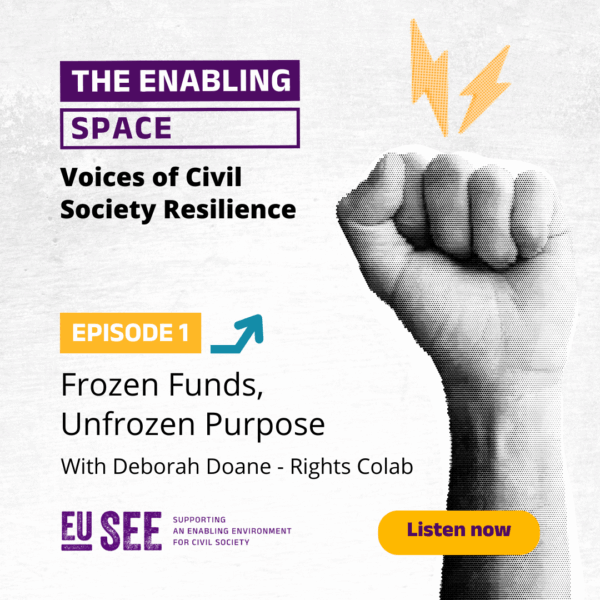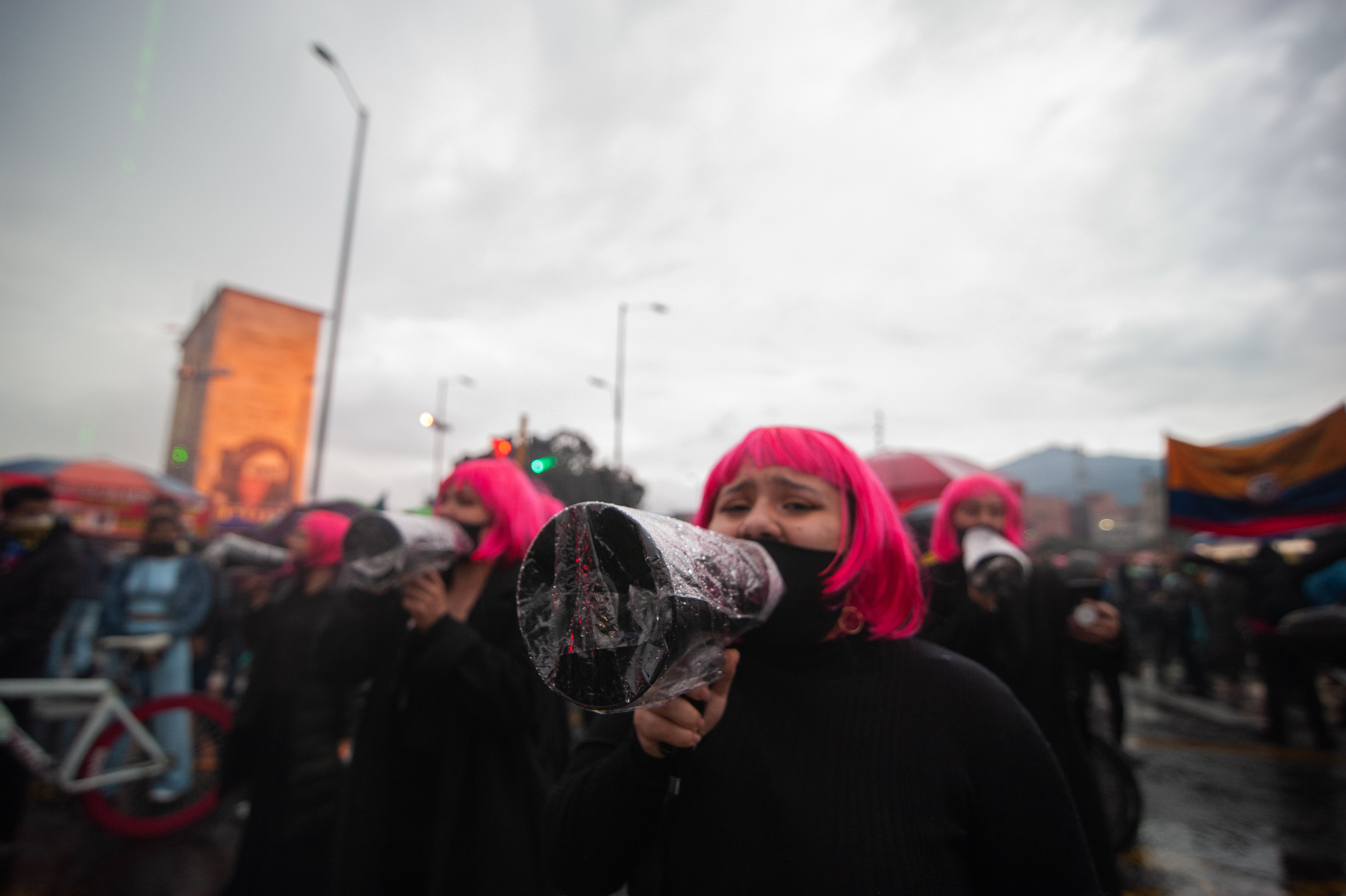By Bibbi Abruzzini and Clarisse Sih, Forus, EU SEE Consortium partner
Article published on www.forus-international.org
At a time when traditional aid pipelines are freezing and funding is becoming increasingly scarce, something else is happening as well: civil society around the world is reclaiming its power, reframing the narrative, and challenging models of aid.
As part of the EU SEE consortium, Forus is developing a podcast series Frozen Funds, Unfrozen Purpose. For this article, we sat down with Deborah Doane—Partner at Rights CoLab and convener of the RINGO Project—to unpack how to transform the donor landscape for justice.
Power relationships in the funding system
USAID donor funding freeze has been the catalyst and the biggest, but many other donors are shifting their priorities and shrinking aid, Deborah explains. “There’s a couple of dimensions here. First of all, with so few funds, I think it’s actually ridiculous that donors decide where those funds should be allocated. They are prioritizing decisions based on humanitarian goals versus rights-based approaches, or what they believe aligns with the interests of donor countries or represents good value for money. This often overlooks the actual challenges that aid is intended to address and the real needs of local communities. This comes back to the biggest dimension to me which is that power relationships are still one of the most urgent challenges in the whole funding system.”
This moment, Deborah argues, could be a catalyst to reimagine funding relationships, especially as traditional aid systems become increasingly scarce. Too often, she says, the debate focuses on quantity—how much, how fast, to whom—instead of the deeper systemic change we need.
Deborah has been in the sector for over 30 years now and started when it was “kind of the heyday of aid, aid was growing”. It was also the heyday of justice-based work. “We did have work around international debt relief, around trade justice, around addressing corporate accountability and the rise of those movements,” Deborah explains mentioning the protests in Seattle. The 1999 Seattle WTO protests, sometimes referred to as the Battle of Seattle were concerned about the potential negative effects of global trade policies which disproportionately benefited multinational corporations and wealthy countries while harming workers, the environment, and marginalized communities in poorer nations.
The current global aid architecture
The current global aid architecture—largely shaped in the aftermath of World War II through mechanisms like the Marshall Plan—presents an opportunity for rethinking rather than dismantling. Aid should be viewed not merely as charity, but as a form of structural compensation for the systemic inequalities embedded in the global economic order. While high-income countries contribute an average of only 0.3% of their gross national income in aid—well below the UN’s 0.7% target—they continue to benefit disproportionately from a global system that extracts trillions from the Global South through imbalanced trade, debt repayments, and tax practices. This underscores the need to reframe aid as part of a broader effort to address historical and structural injustices, as well as to ensure that recipient countries have greater agency in shaping their own development trajectories. In the interim, however, support remains critical as many communities continue to face immediate challenges; while the system changes, people still need to get by – fighting structural problems.
“It’s not just about simply increasing aid; it’s bringing justice to the policy systems. Ultimately, if you address justice, you shouldn’t need aid. I’ve long been involved in campaigns and organising around root causes, the systems that cause aid, that cause poverty, that cause inequality, that cause climate change. And funding justice really needs to address those issues much more so than traditional charitable causes.”
Deborah links today’s broken model to what she calls the “McKinsey-ization” of aid—when audit culture and logic models took over development in the late 1990s and early 2000s. This led to an ecosystem obsessed with control and compliance, often at the expense of impact. Through the RINGO Project, Deborah and others experimented with what it might look like to replace mistrust with trust. In one prototype, they brought donors, INGOs, and grassroots groups together to address risk and reporting. The result? A shift from 50 reporting dimensions down to a single metric.
“This goes back to my first point around addressing power. We need to build much more trust in the system and trust in other actors, trust in civil society, rather than setting up a system of mistrust. And we need to work on those relationships between the different parts of the system,” Deborah says.
Examples of trust-based and innovative funding models
While bilateral donors remain slow to change, Deborah highlights the work of philanthropic actors such as the Firelight Foundation—who support community-driven planning with multi-year core funding—and Global Greengrants Fund, which uses participatory grantmaking to reach frontline environmental defenders. Others, like One World Together, are experimenting with democratizing funding through public solidarity.
But beyond funding models, narrative matters too. As noted in several recent EU SEE alerts by civil society organisations, funding cuts also trigger anti-civil society and rights narratives. Narratives and funding issues are increasingly intertwined in a dangerous cocktail. On the one hand we have noticed in countries such as Mexico, Nigeria and Uganda organisations have warned that once funding disappears, governments use it to discredit the work of civil society. At the same time, aid recipients are not seen as partners but as passive recipients of help.
Deborah calls for a reframing that recognizes shared struggles and shared solutions. In Hungary, the Civilization Coalition is flipping the script—celebrating the power of grassroots movements to create more resilient societies. In Zambia, through RINGO’s “reverse call for proposals”, communities mapped their own strengths, identified their needs, and then invited the international community to support them—on their terms.
“In the prototype, a community in Zambia mapped their assets and they said, well, this is what we’re already good at. And this is where we need the international system to come in and support us. They issued their own call for proposals to the international sector to come and support them. And it was a completely different starting point,” Deborah explains. The story or narrative they were telling was: “we have strength, we have the ability to decide and allocate resources and still work in partnership.”
What is the antidote to the current aid system?
The ‘antidote’ to a neo-colonial aid system for Deborah is situating power at the local level. It’s establishing new forms of accountability where right now the donors hold all the cards and CSOs or local actors are accountable to them for delivery based on their terms. What is that bottom up or circular form of accountability that we can bring in? A dimension of it can be core flexible funding: “When it is given, it is given openly,” Deborah explains. “If you want to build strong civil society organizations, they need to have a foundation on which to build their own work. Core funding is a part of that. And we don’t give almost any at all.”
So what does courageous system change actually look like? For Deborah, two things rise to the top: narrative and power. First, we need a new story. “I think we could be doing so much more to build the narrative—not just around solidarity with people but showing that the issues we face in Europe, or the US are not dissimilar to those in Africa, Asia or Latin America. Structural inequality is the root cause everywhere.”
Second, we need to re-engineer how funding works. “I’m such an advocate for the reverse call for proposals. It puts those of us in the Global North in service to those in the Global Majority. We should ask: what assets do they already have? What do they need from us? Rather than deciding on their behalf.”
And power? That might require some institutions—especially INGOs in the Global Minority—to take a step back. “Maybe INGOs need to shrink. Maybe they need to step aside. If they do that, they’ll become something different—something more meaningful. Then we can work together in a completely different way.”
Civil society is already doing the work: reframing narratives, redefining power, and rebuilding systems rooted in justice, not charity. The question now is whether the rest of the system is ready to follow. This is where a clear call to action for OECD countries and donors becomes critical: to align with these efforts by restructuring aid as a tool for equity, not benevolence, and to support systemic transformation rather than maintain the status quo.
“Where Global Majority actors are seeing that we need to control our own destiny. And what they’re doing is they’re harnessing the power; they’re changing the terms of the conversation.”

